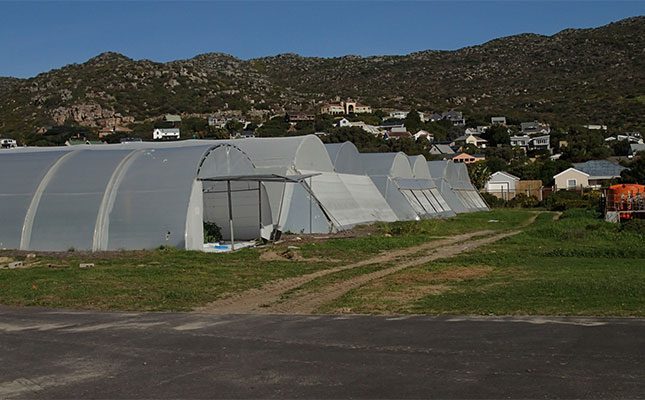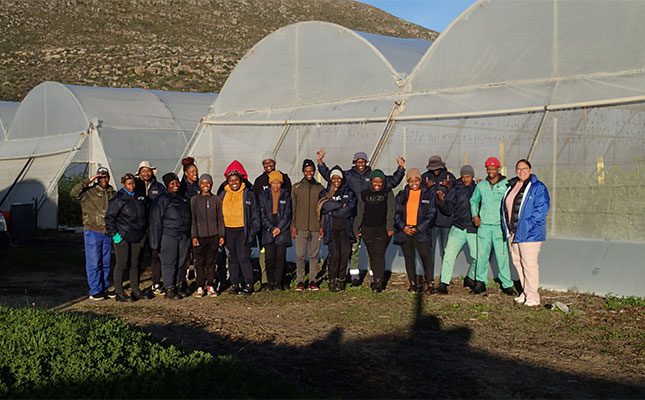
It isn’t easy to arrange a visit to Living Hope’s headquarters in Capri, Cape Town; there are rules and protocols to be observed. Once inside the premises, it quickly becomes clear that this is a serious operation.
Order prevails, buildings are impeccably maintained, the grass is cut, people are working, and media liaison officer Candice Thomas is waiting to take me to the office of her husband, Victor Thomas, the non-profit organisation’s (NPO) executive director.
A growing vision for agriculture
In a country where high crime rates and rising levels of unemployment, poverty, and hunger have become familiar, Living Hope models positive, solutions-driven action.
It supports disadvantaged communities, providing relief when disaster strikes, feeding the hungry, educating the young, making healthcare and medication available to the sick, caring for and comforting the dying – and training young people who show aptitude for agriculture to grow food, create businesses, and become South Africa’s future farmers.
Victor is a man of physical and intellectual presence with a quiet, soft-spoken manner that belies a steely resolve to implement Living Hope’s aim of upskilling and empowering young, would-be farmers so they can become part of the solution to food insecurity and unemployment.
“We want our graduates to become successful farmers, competent to work in the commercial [agriculture] sector or in their own farming businesses,” he says.
Living Hope’s ambition for its agricultural arm isn’t limited to the Cape Peninsula; there is another farm soon to come online, close to Gonubie, just outside East London in the Eastern Cape.
“The start-up work is being done by three highly competent young graduates from our programme here who are setting up the farm to support training in the Eastern Cape. They send me a monthly report, which includes goal setting. Other than my scheduled visits, I let them get on with it,” says Victor.
“We try to select young people who are in agriculture for the long run. Audits show that over 90% of our graduates stay in agriculture, and that the programme has produced expert farmers,” adds Candice.
Training and agronomy
The primary objective of the Living Hope farm is training, which covers all aspects of the intensive fresh produce farming business, or what the NPO calls ‘from seed to sale’.
“Our students get the opportunity to learn every aspect of the business from seed germination to packaging and marketing,” says Chantel Liebenberg, agriculture programme manager.
“Business skills, personal and business finance, client interaction, and marketing are also an essential part of the training,” she adds.
Chantel and agronomist Sam Sithole jointly manage the farm and work with about 30 students.
“We farm 3,5ha of Living Hope’s 7ha property. This space is taken up by five double-span tunnels (30m x 14m each), three single-span tunnels (30m x 8m each), one area under shade netting, a small open field section, and a duck enclosure. We need an average of about 30 000ℓ of water a week for our irrigation systems, and we are fortunate to have a year-round supply of water from two boreholes,” says Sam.
In the tunnels, they grow tomatoes, cucumbers, and green and red peppers in grow bags. A variety of speciality lettuces are grown in the hydroponics tunnel. Brinjals, carrots, spinach, broccoli, and maize form the bulk of the winter crops under shade netting.
“All the tunnel crops are drip irrigated,” adds Sam.
Living Hope is off the grid during summer but relies partly on Eskom’s power supply during winter. “Going off the grid reduces costs and means we are not affected by load-shedding,” explains Victor. “It’s also important to be able to keep produce fresh in cold storage.”
“We stagger the groups [of students] so that we have juniors, intermediates, and senior students at any given time. This means we can integrate and pair seniors with juniors so that seniors get some management experience and juniors get mentorship from their more experienced peers,” explains Chantel.
Living Hope’s current students mainly come from three technical and vocational education and training colleges: Lovedale and Ikhala in the Eastern Cape, and Boland in the Western Cape. The students have completed 18 months of theoretical training in farm management and need a further 18 months of practical training before they can graduate.
Chantel flies to the Eastern Cape to interview and select candidates who are a good fit for the Living Hope system. “It isn’t easy for young people to find farms or agribusinesses that offer practical training,” she says.
Living Hope sees training farmers as a way to stabilise and grow the agricultural economy. “Agriculture has enormous potential to boost the GDP and secure the country’s food supply,” says Victor. “Of course, it is expensive, but we see our future farmer graduates as a vital contribution to transformation and community upliftment.”

Hands-on experience
Every student is allocated a plot and two rows (four lines) in a tunnel, which they must work. The work includes tilling (where practised), fertilising, planting, irrigating, weeding, pruning, scouting, and harvesting.
The farm ethic favours farming with nature, but soft chemicals are used in the tunnels when necessary, as hot, humid conditions may create a favourable environment for pests and diseases.
Students run harvest days twice a week. Teams go out to pick produce, load it onto the farm bakkie, and offload it into the shed where it is weighed, sorted, graded, and packaged.
Orders are filled for the farm’s clients, which include a number of local restaurants, farm stalls, and 35 spaza shops in the nearby settlement of Masiphumelele. Vendors from the settlement also buy produce from the farm.
“We use excess produce for our own feeding schemes, but we’re careful not to undermine local food systems like spaza shops and street vendors,” explains Victor.
Future farmers
While the sale of farm produce provides a useful source of income, Victor stresses that the primary goal of their agricultural programme is to create a future generation of farmers for South Africa.
“Our programme supports better nutrition in disadvantaged communities, where woefully inadequate nutrition leads to a number of serious health problems. We try to teach our future farmers to be aware of these problems in the communities in which they work. We want to create businesses and highly skilled farmers, but we also want them to have a compassionate heart and be aware of the realities of our country,” he explains.
Get trusted farming news from Farmers Weekly in Google Top Stories.
➕ Add Farmers Weekly to Google ✔ Takes 10 seconds · ✔ Remove anytime






